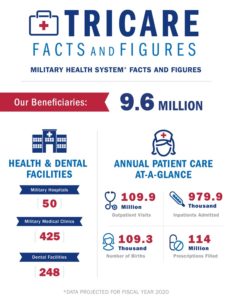 HATTIESBURG, MS — Prosecution continues for defendants charged in a number of nearly-identical schemes to defraud TRICARE and other insurers out of hundreds of millions of dollars by exploiting a former loophole in the billing process for compound drugs.
HATTIESBURG, MS — Prosecution continues for defendants charged in a number of nearly-identical schemes to defraud TRICARE and other insurers out of hundreds of millions of dollars by exploiting a former loophole in the billing process for compound drugs.
The cases center around prescriptions for high-priced and mostly ineffective pain creams prescribed to servicemembers — prescriptions that cost TRICARE more than $500 million at the peak of the fraud in 2014.
On July 20, David Rutland, a pharmacist and co-owner of several compounding pharmacies, pleaded guilty at a Hattiesburg federal courthouse to his role in a scheme that allegedly resulted in more than $180 million in fraudulent billing, including $50 million paid by federal healthcare programs. According to court documents Rutland admitted to working with three other defendants to “solicit, receive, offer, and pay illegal kickbacks” and faces a maximum of five years in prison.
The scheme in which Rutland admitted to playing a role involves selling medically unnecessary pain creams to servicemembers and other patients. The pain creams, usually prescribed to treat pain and scar tissue, were compounded medications. Rutland and his co-conspirators worked to adjust the prescription formulas to ensure the highest reimbursement regardless of effectiveness.
The scheme was effective because, prior to 2015, compound pharmacies were able to bill TRICARE and some other benefits systems for each separate ingredient in the cream. Those who took advantage of that loophole added as many high-priced ingredients as possible, resulting in creams that could be billed to TRICARE for as much as $15,000 for a month’s supply.
A study published in the Annals of Internal Medicine in 2019 found that these creams, despite their high-priced ingredients, worked no better than creams with no medication added at all. Because compound pharmacies create made-to-order medications, their products are not approved by the Food and Drug Administration.1
In the scheme developed by Rutland and his co-conspirators, recruiters procured prescriptions for these high-margin compound medications and were paid commissions based on the percentage of reimbursements from pharmacy benefits managers.
In 2010, compound medications made up about $24 million of the $6.6 billion spent by TRICARE on outpatient pharmacy orders. In 2014, the cost had risen to $500 million and was on track to quadruple in 2015. By April 2015, compound prescriptions made up only 0.5% of prescriptions but accounted for 20% of costs—mostly due to multiple fraud schemes. It was this exponential growth in billing that clued military officials in on the fact that the system was being taken advantage of.
Loophole Closed
In 2015, TRICARE began screening each clinical ingredient in a compound drug, effectively closing the loophole.
Last month also saw the conviction of Erik Santos, who helped run a similar scheme in Florida. Santos entered a guilty plea and was sentenced to 11 years in federal prison for defrauding TRICARE of approximately $12 million through a similar compounding pharmacy fraud scheme. He also will have to pay $11.8 million in restitution.
According to court documents, Santos and his partners paid recruiters to persuade TRICARE beneficiaries to fill prescriptions for compound medications, then paid doctors to approve preprinted prescriptions for large amounts of these medications. The physicians did not see the beneficiaries prior to approving the prescriptions.
Having procured the patients and the prescriptions, Santos then steered the beneficiaries to fill their prescriptions with Patient Care America (PCA), a compounding pharmacy located in Broward County, FL, according to court documents. PCA would fill the prescriptions, bill TRICARE, and pay Santos a fee for each patient delivered. Over time, those kickbacks to Santos totaled over $7 million.
“Billing healthcare programs for medically unnecessary medications not only undermines the viability of those programs, it exploits all citizens,” declared Defense Criminal Investigative Service Special Agent in Charge Cynthia Bruce after Santos’ plea.
Other variations of these schemes have been discovered operating across the country. In one case out of Orange County, CA, conspirators set up bogus pain clinics to recruit TRICARE beneficiaries, as well as members of the International Longshore and Warehouse Union’s Pacific Maritime Association Welfare Plan. The conspirators in this case paid beneficiaries $200 to receive treatment from doctors who were supposedly conducting pain studies to evaluate the effectiveness of compound pain creams.
The largest known example of this particular fraud scheme was also based in Hattiesburg. According to court documents, between 2012 and 2016 Wade Walters, co-owner of a number of pharmaceutical distributors and compounding pharmacies, was the mastermind behind a pain cream fraud that resulted in $510 million in illegal profits. In January 2021, Walters was sentenced to 18 years in prison and ordered to pay a total of $345 million in restitution.
- Butcher RE, Kurihara C, Bicket MC, et al. Compounded Topical Pain Creams to Treat Localized Chronic Pain: A Randomized Controlled Trial. Ann Intern Med.2019;170:309-318. [Epub ahead of print 5 February 2019]. doi:10.7326/M18-2736

